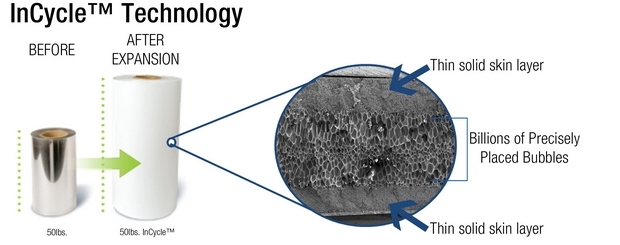Native American tribe invests in sustainable plastic company
- February 19, 2013
- By Jennifer Kalish
 Courtesy, MicroGREEN Polymers Inc.
InCycle cups are lightweight because
they use significantly less plastic than the average cup.
50% of the PET that goes into InCycle cups and trays comes
from recycled water bottles.
Courtesy, MicroGREEN Polymers Inc.
InCycle cups are lightweight because
they use significantly less plastic than the average cup.
50% of the PET that goes into InCycle cups and trays comes
from recycled water bottles. Koran Andrews, CEO of the Stillaguamish Tribal Enterprise Corporation, took a tour of the MicroGREEN Polymers Inc. facility in Arlington, Wash., with the intention of purchasing recyclable cups for the tribe's casino.
Not only did the tribe order the cups for its Angel of the Winds Casino, it ended up investing $5 million into the company.
"It was kind of meant to be," Andrews said. "They fall in line with what we value in regards to doing what we can for this planet while we're here. And that's really important to Indian tribes — protecting Mother Earth."
In addition to being recyclable, 50% of the PET that goes into InCycle cups and trays comes from recycled water bottles. Using recycled bottles helps prevent a significant amount of plastic from ending up in landfills or getting shipped off to China, said Chris Jacobs, vice president of marketing and product development at MicroGREEN. The other 50% derives from virgin PET.
"In the U.S. we recycle less than 30% of water bottles," said Jacobs. "Consumers know that water bottles are a problem."
After making the commitment to use InCycle cups in the casino, and despite having never invested in other companies before, Andrews felt strongly about investing in MicroGREEN.
"After the tour, it became very clear to me that this is a brand new technology that can really do some good," Andrews said. "Not just for our local economy, but for the environment as well."
The tribe's investment to the company is part of a larger effort by MicroGREEN to expand its production of recyclable plastic products, Jacobs said.
The company's goal for this round of investments is to receive $20 million in funding, which would create approximately 200 jobs at its pilot facility in Arlington by the end of the year, he said.
Currently, the company has two production lines and employs 40-45 people at the Arlington facility. If its investment goal is reached, the company hopes to add two more production lines, Jacobs said.
Andrews and Jacobs are working together to encourage other Native American tribes to invest in the company. "We have made a number of presentations," Jacobs said. "There's been a lot of interest but nothing press-ready."
MicroGREEN offers two varieties of InCycle cups: the 18 ounce cold cup and the 9 ounce coffee cup, though they developed a special 12 ounce cup for the tribe to offer at its casino that should be available at Angel of the Winds soon. The tribe will also offer InCycle cups at the convenience store it is opening in Arlington, Jacobs said.
Before making the switch to InCycle cups, the tribe offered wax-covered paper cups to casino patrons, which are not recyclable.
"They just go directly into the garbage," Andrews said.
The method in which InCycle products are produced is largely accountable for their level of sustainability. The process pressurizes PET with carbon dioxide and warms it enough for the plastic to expand, allowing manufacturers to reduce the amount of source material without using potentially harmful foaming agents, Jacobs said.
Not only is the process inexpensive, but a finished InCycle cup uses 50% less plastic and weighs 50% to 80% less than the average plastic cup.
Jacobs hopes to make the products more readily available for industries such as airlines, food processors and quick-serve restaurants, Jacobs said. The company's priority is to sell to businesses, but the cups can be purchased by consumers online at Amazon.com.
"MicroGREEN's cups are generally able to be sold for a more competitive price than your average plastic cup," Andrews said. "There is definitely an economic benefit."
![]()
w w w . w a s t e r e c y c l i n g n e w s . c o m
copyright 2013 by Crain Communications Inc. All rights reserved.